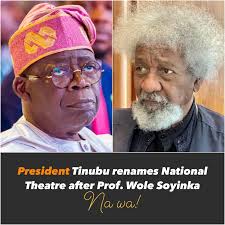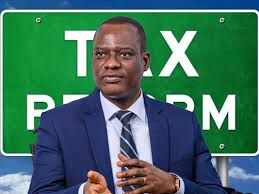President Bola Tinubu has honored Nobel Laureate, Professor Wole Soyinka, by renaming the National Arts Theatre in Iganmu, Lagos, after him. The announcement was made in a tribute by Tinubu to celebrate Soyinka’s 90th birthday.

The tribute, titled “Professor Wole Soyinka at 90: Tribute to a National Treasure and Global Icon,” was signed by the President and released to the press on Friday.
Tinubu expressed his joy in joining admirers worldwide to celebrate Soyinka, noting that July 13 would be the highlight of various local and international events held in his honor.
In his tribute, Tinubu wrote, “Professor Soyinka, the first African to win the Nobel Literature Prize in 1986, deserves all the accolades as he marks the milestone of 90 years on earth. Having beaten prostate cancer, this milestone is a fitting testament to his resilience as a person and the significance of his work.
“It is also fitting we celebrate this national treasure while he is still with us. I am, accordingly, delighted to announce the decision of the Federal Government to rename the National Theatre in Iganmu, Surulere, as the Wole Soyinka Centre for Culture and the Creative Arts.”
Tinubu highlighted that Nigeria celebrates not only Soyinka’s remarkable literary achievements but also his unwavering dedication to the values of human dignity and justice.
“When he turned 80, I struggled to find words to encapsulate his achievements because they were simply too vast. Since then, he has added to his corpus with his series of Interventions, which have been published in many volumes.
“Professor Soyinka is a colossus, a true renaissance person blessed with innumerable talents. He is a playwright, actor, poet, human rights and political activist, composer, and singer.
“He is a giant best riding not just the literary world but our nation, Africa, and the world,” Tinubu affirmed.
The President emphasized that Soyinka is one Nigerian whose influence extends beyond the country and inspires people globally. Since his youth, Soyinka has been a vocal critic of oppression and injustice, from apartheid in South Africa to racism in the United States.
“Beginning from his 20s, he took personal risks for the sake of our nation. His courage was evident when he attempted to broker peace at the start of the civil war in 1967. Detained for two years for his bravery, he narrated his experience in his prison memoir, ‘The Man Died.’
“Despite deprivation and solitary confinement, his resolve to speak truth to power and fight for the marginalized was further strengthened.
“Our paths crossed during our struggle for the enthronement of democracy in Nigeria following the annulment of the June 12, 1993 presidential election,” Tinubu recounted.
Read also:
- #ENDSARS: DJ Switch Responds to ECOWAS Court Ruling
- Nigerian Man Goes Viral After Kneeling to Beg Lady for Her Phone Number
- 5 Easy Things to Do When You’re Bored
- How to Feel Confident if You Struggle with Low Self-Esteem
- ‘I am not afraid’ – Phrank Shaibu Corrects Minister’s Spoken English Error
- Supreme Court Grants Financial Autonomy to Local Governments
- Dino Melaye Spotted Buying Black Market Fuel for His Ferrari; Video Goes Viral
- Lady Reveals Food Abundance at Boyfriend’s House When She’s Around Versus When She’s Absent
- The Story Behind Viral Photos of Messi and Six-Month-Old Lamine Yamal
- Seyi Law Subtly Shades Amid Toyin Abraham and Ayo Drama
- God is Not a Christian, Says Popular Nigerian Pastor
- Tacha Shows Support for Toyin Abraham Amid Free Ayo Campaign
- Tinubu Invites Labour Leaders for Minimum Wage Talks
- BLord Splashes Millions on a New Lexus GX 460



